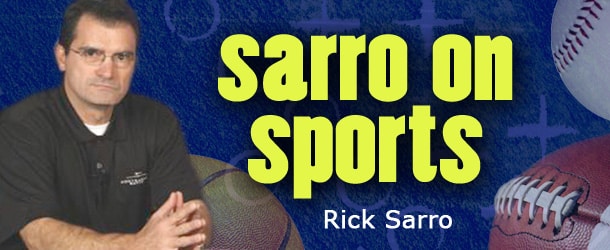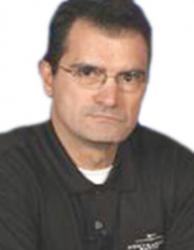Two men recently broke barriers and boundaries in sports, not for athletic prowess, but for decisions and actions that will have lingering effects.
Missouri defensive end Michael Sam and Oklahoma State guard Marcus Smart were cast in the national media spotlight, dominated the Internet headlines, and commanded the twitter world for completely opposite reasons, but each situation was a strong commentary on our ever-changing societal values and beliefs.
Sam did it with words — a simple, dignified announcement.
Smart was driven by emotion and a physical confrontation.
Both prompted a debate that has no clear-cut, correct answer.
Sam, the co-defensive player of the year in the SEC, executed a well-timed and -planned announcement that he is gay and plans to be on an NFL roster this season.
“I am an openly, proud gay man,” Sam told ESPN and the New York Times. “It’s a big deal. No one has done this before (announced his homosexuality while on the verge of becoming an active player in the NFL). And it’s kind of a nervous process, but I know what I want to be — I want to be a football player in the NFL.”
And with that, another historic line has been crossed in our society, and within the national treasure which is the NFL.
It is a very big deal.
There have been numerous gay players in the NFL, but none let their sexual orientation be known until after retirement. An openly gay player like Sam seeking entry into the bastion of masculinity, manhood and testosterone that is the NFL is breaking new ground, and will garner unprecedented conversation, commentary, concern and attention.
The fact that Sam’s teammates at Missouri have known since last August should be a fair barometer of the locker room acceptance of a gay player. Apparently, Sam did not attempt to hide who he is around the university campus either.
It is mind-boggling to me that Sam’s story took so long to come out in the first place. Credit his Mizzou teammates and coaches, who let Sam decide when the announcement would happen, and how. Rumors were already in the air at the post-season Senior Bowl in Mobile, as pro scouts were asking questions and wondering aloud about Sam’s private life.
The careful timing of Sam’s announcement was obvious, as it happened just ahead of the fast-approaching NFL combine, which is pro football’s ultimate interrogation week in preparation for the May draft.
Sam was right in doing it on his terms and according to his own platform before the story broke, when he would have to face the barrage of questions and personal probes.
It is clear that Sam, a 6 ft., 2 in., 260 pound defensive lineman who won a top defensive award in the country’s best and toughest conference, is ready for the NFL. The question is whether the NFL ready for Sam.
The NFL said the appropriate things about Sam’s honesty and courage, and about how the league “looks forward to welcoming and supporting Michael Sam in 2014.” Commissioner Roger Goodell, who, by the way, has an openly gay brother, has talked over the past few years about the issue of gay players in the league.
Goodell can legislate, administer, foster and encourage acceptance, but he can’t control the drafting, selection and signing of any player, gay or straight.
Anonymous pro scouts have expressed skepticism about Sam’s skill set, and whether it is good enough for the NFL. Various players and team executives have also voiced concern over locker room chemistry, and whether the addition of a gay player would force some players out of their comfort zone.
It is a legitimate issue and concern that will be thoroughly discussed in the days and weeks leading up to the draft by every team, every coach and every general manager in the league.
The locker room turmoil that imploded into the national embarrassment and PR disaster that rocked the Miami Dolphins has given the bully activists and victims new faces in the form of Richie Incognito and Jonathan Martine, respectively. The verbal assaults in this case not only involved racial slurs, but anti-gay rants as well.
The Dolphins lost control of this situation, as teammates did not suppress nor stop the actions. The locker room check-and-balance system failed miserably.
Who is to say that this can’t and won’t happen again, and this time centered on Michael Sam, the first to bear the burden and cross the line of secrecy?
If it does happen, the future path for active and openly gay athletes seeking their rightful opportunity in the NFL, NBA, NHL or Major League Baseball will be blocked by a movement that may be ahead of its time.
While the headlines touted the barriers that Sam will soon break, Marcus Smart went headlong across an invisible boundary that separates athletes and fans.
During a recent basketball game between Big 12 rivals Oklahoma State (Smart’s team) and Texas Tech in Lubbock, Texas, Smart charged into a group of courtside spectators and shoved a Red Raider fan nearly off his feet.
It wasn’t the first physical altercation between an athlete and fan during a game. The worst and most-publicized was the near riot involving then-named Ron Artest and numerous Detroit Piston fans a number of years ago. Artest and several teammates attacked fans who heckled them and threw beer on the players.
It was violent, ugly and dangerous. The scene prompted professional and college teams, sports stadiums and arenas to enact policies and rules aimed at regulating fans conduct. If fans use hate language, inappropriate gestures or signs, or engage in disruptive actions, they will be forced to leave the venue and face revocation of future attendance.
The altercation between Smart and the fan, Jeff Orr of Lubbock, was the first, to my knowledge, involving a college player retaliating against a spectator.
Soon after Smart was pulled from the seats, he claimed Orr called him the N-word. Orr denied that, but admitted and apologized for screaming that Smart was “a piece of crap.”
Orr has a bit of history when it comes to unacceptable behavior. He was caught and reprimanded for making obscene gestures last season during a Texas A & M game.
In many cases, where there is smoke, a fire still lingers.
I believe Smart heard a racial slur coming from that fans section, and saw and heard Orr call him something. His emotions and adrenaline level got the best of him, and he stumbled into the crowd after a physical play under the basket.
I am most assuredly in the minority here, but I feel Smart was right in his actions to react against Orr, but was wrong for physically shoving him.
I don’t blame Smart for crossing that line between the playing court and fans seats, if the fan in question went beyond the code of decency and acceptable conduct.
Whether it was the N-word, the phrase “piece of crap,” or any other profanity-laced tirade, words do hurt, and they do affect people. I don’t care if those words are aimed at athletes in action or at any Joe Blow on the street.
I have been to countless games as a fan, and many more as a sports reporter. I am guilty of tuning out fans in general, but I have heard some things that made me cringe, mostly at professional events. The worst I have heard at college games was something in the range of “you suck.”
I believe there is a difference between a pro athlete and a college player when it comes to ambivalence to fans’ profanity and verbal attacks. The Pro is paid to ignore ignorance. The collegian is not.
What would drive a 40- or 50-year-old fan to call a 19- or 20-year-old college player a piece of crap, or worse? What kind of low-life would curse or spew racial slurs at any athlete, or anybody at all, for that matter?
If you don’t have the guts to say it to a man walking toward you on the sidewalk, then you should not be allowed to yell it from a stadium seat, or be protected from consequences for doing so.
If you choose to act like an ass, then you might want to be prepared to get your rear end whupped.
In my opinion, Smart would have been within his rights to walk up to Orr, point him out and challenge him to keep his big mouth shut. Smart and his coach, Travis Ford, then should have asked arena security to have Orr and his party removed from the game.
Smart’s three-game suspension for shoving Orr was too harsh. A one-game sit-down would have better suited to his actions.
Player and fan interaction like this can get dicey if a player thinks he hears something and accuses the wrong fan. Physical contact in any of these situations should not be allowed, for that very reason. But players can and do hear all kinds of talk from those close court-side seats.
Buying a ticket does not give anyone the right to ridicule, curse or dehumanize athletes. That barrier is no longer a sacred boundary that protects the idiots and imbeciles simply because they may be season ticket holders.
The phrase stating that sticks and stones can break your bones and words can never hurt you was meant for the kids’ playground. It doesn’t work in the world in which we live today.
You can see and hear Sarro’s commentary and insights on Soundoff 60 nightly at 9 pm and Saturday and Sundays at 10 am on Suddenlink Cable channel 60.

















Comments are closed.